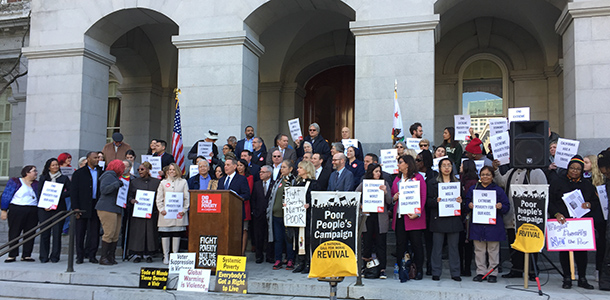
Conway Collis, president and CEO of GRACE, leads news conference this week in Sacramento (Photo: Deb Kollars/CAFwd)
Lifting children and families out of poverty stands as one of California’s most urgent challenges, with moral, human and fiscal ramifications. This week, at a crowded event on the steps of the Capitol building in Sacramento, California legislators, business leaders and community representatives expressed their commitment to place into action a set of strategies designed to lift an estimated one million children out of poverty.
The strategies are contained in the recently released report of The Lifting Children and Families Out of Poverty Task Force, created by Assembly Bill 1520.
In the new legislative session, Californians can expect to see an array of AB 1520-related bills by multiple lawmakers moving forward alongside policy initiatives by Governor-elect Gavin Newsom’s administration, all aimed at ending child poverty, especially for those most deeply in need.
The momentum doesn’t stop there.
California Forward and its partners in the California Economic Summit, are simultaneously working on strategic new innovations for reducing poverty, increasing upward mobility, and reviving economic opportunity for people across California. The initiatives are far-reaching and transformative:
Reshaping the Safety Net: For those living in poverty, the traditional safety net of services and programs serves as both a lifeline and a means toward achieving financial independence. Through the creation of a new state-local partnership structure, this safety net can be transformed to better meet the basic needs of individuals and families so they are able to become self-sufficient.
Such a partnership would work with willing counties to incubate new systems for providing tailored and integrated family supports, and ultimately pave the way for these new models to serve as the foundation for a new safety net serving all communities and regions in California. The new partnership is among several initiatives that together form the Summit's overall prescription for reducing poverty, which also focuses on creating middle-income jobs, workforce development, and housing and community development.
Establishing the California Dream Index: On behalf of the Summit, CA Fwd and its partners at Redstone Strategy Group are also developing the California Dream Index, a new scorecard that will track how Californians are faring in terms of their financial security and prosperity. It will also track drivers of economic mobility, such as education and health. The index has potential for focusing policy and budget discussions at the state and local levels on actions that would serve to meaningfully reduce poverty, increase economic security, and restore upward mobility. Public release of the first version, with baselines and targets, is expected during 2019.
Creation of the California Local Empowerment Fund: In a new initiative to close the economic inequality gap, Third Sector Partners, REDF and CA Fwd are developing a proposal for the next generation of the federal Social Innovation Fund, to be focused on California. The federal Social Innovation Fund drove $1 billion of support to economic opportunity efforts by deploying $352 million in federal dollars and the leveraged match of another $707 million from the private sector.
The vision for the California Local Empowerment Fund is to make financial and technical assistance investments in specific initiatives to accomplish large-scale, public/private and cross-jurisdictional initiatives, build infrastructure to replicate evidence-backed initiatives, and expand the pool of capital available by better aligning private sector and government funding and expertise.
Expanding Early Childhood Investments: A new wave of early childhood work, focusing on investments in our youngest children, holds potential as a key force in transforming the state into a place where prosperity is shared by all. In just a few short years, baby boom retirees will have left a chasm in the workforce that cannot be filled unless all children are sufficiently educated and prepared to contribute meaningfully to the economy. For 20 years, First 5 county commissions have operated to address the needs of children ages 0 to 5. Now, through the Economic Summit, California’s business and economic leaders, local communities, and government are forging new partnerships with First 5 to create new and more effective and comprehensive systems for addressing early childhood care and education needs in California.
These initiatives are proceeding in alignment with the AB 1520 Task Force recommendations, which can be found here. As highlighted at the Capitol event on December 3, forthcoming legislation will embrace many elements of the AB 1520 Task Force report. For example, the author of AB 1520, Assembly Member Autumn Burke (D-Inglewood), will introduce bills to promote a targeted child tax credit for families in deep poverty, enhanced jobs, and clean and safe shelter for all children. Other lawmakers are planning to target expanded pre-school, healthcare and home visiting services, housing, and foster youth needs.
Together, these efforts hold promise for eliminating poverty, creating greater economic and social equity for families and individuals, and strengthening communities and the state as a whole.

